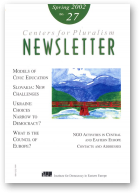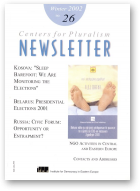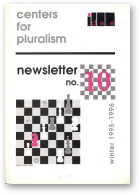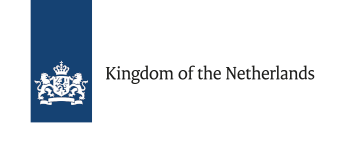- Галоўная старонка
- Што новага
- Кнігі
- Аўдыёкнігі
- Пэрыёдыка
- Радыёперадачы
- Музыка
- Відэа
- Пляны
- Каталёг БГТ
- Каталёг EEDC
- Крама
- Каталёг Скарынаўкі
- Каталёг MiOKB
- Прыватны каталёг
- Беларускія аўтары
- Выдаўцы і выдавецтвы
- Выдавецкія сэрыі
- Беларускія эміграцыйныя калекцыі
- Афарызмы
- Нашыя банэры
- Пра нас
- Партнэры
- Пошук/ Каталёг
- Архіў навінаў

|

|
Centers for pluralism
newsletter
27/2002
Месца выхаду: Warsaw
Дата выхаду: 2002-04
Рэдактар: Jakowska Anna
Выдавец: Institute for Democracy in Eastern Europe
Памеры: 68 s.
Кнігазбор: EEDC — бібліятэка Усходнеэўрапейскага дэмакратычнага цэнтру, ul. Proletariacka 11, Białystok (папяровы асобнік)
Інвэнтарныя нумары: EEDC — [2770], [2770-2]
The idea of general civic education is inseparably connected to the idea of democracy. Already in ancient Athens, it was assumed that every citizen should actively and fully participate in the governance of the country. Thomas Jefferson’s statement above points directly to the need to introduce various forms of civic education. The introduction of general civic education is often also connected to the aim of authorities to introduce a new, democratic order. Following the Second World War, for example, the Allies undertook a huge effort aimed at transforming German and Japanese societies. In united Germany, the federal authorities placed a huge emphasis on a campaign of civic education for citizens in the eastern lander. The introduction of civic education, particularly in school, is sometimes the reaction to a crisis in democratic societies. The decline in voter turnout noted in recent decades in the United States, as well as John F. Kennedy’s conviction that “in a democracy, the ignorance of a single voter, weakens the security of everyone,” led to the introduction of civics as a required subject in the majority of U.S. states over the course of several years in the 1960s. (Krzysztof Stanowski, Models of Civic Education, fragment)
Каталёг: EEDC
Пэрыёдыка: Centers for pluralism
Варта пазнаёміцца:
Centers for pluralism
newsletter
26/2002
17 November 2001 was a historic date for the citizens of Kosova. For the first time, they participated in free parliamentary elections, choosing from among 18 political parties, three coalitions, one civic initiative, and three independent candidates running for 100 of 120 seats in the Kosova Assembly. Twenty seats were reserved for minority parties as “set-asides”. Kosova Action for Civic Initiatives (KACI), building on its previous wo... Болей »
Centers for pluralism
newsletter
10/1996
What is the "Newsletter”? The Newsletter is a quarterly compendium of information about activities conducted in Central and Eastern Europe and the former Soviet Union by Non Governmental Organizations (NGOs) that work in an area generally called "civic education." What is civic education? This term has several meanings, but we use it in its widest sense: all activities that allow people to become citizens, and all citizens to become bet... Болей »








